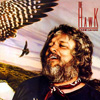RONNIE HAWKINS : THE HAWK
- South In New Orleans
- Shelter Of Your Eyes
- Something's Been Making Me Blue
- Pledging My Love
- Sick And Tired
- Elvira
- Blue Moon Of Kentucky
- Ain't That Lovin' You Baby
- My Babe
- Let It Rock
Label : United Artists Records
Released : 1979
Length : 33:15
Review (AllMusic) : In the wake of his hammy, barn-storming appearance in the Band's The Last Waltz, their early employer Ronnie Hawkins scored one final major-label deal with United Artists and released The Hawk in 1979. This was a major-label, big-budget affair, featuring big-name support as James Burton, Paul Butterfield, Garth Hudson and Keith Allison, who produced this record and gave it a slick, shiny feel not dissimilar to such late-'70s rootsy rock albums by Rick Nelson or revivalists like Rockpile. That production was an attempt to push Hawkins onto mainstream pop radio, as was the decision to record the synth-laced, smooth pop of "Shelter of Your Eyes" and Chinn & Chapman's pulsating, bubblegummy "Something's Been Making Me Blue" - a pretty terrific pop tune that holds its own next to such great soft rock as Rocky Burnette's "Tired of Toein' the Line," even if it doesn't feel very much like the Hawk. Hawkins is enough of a professional to gamely give it his all on these glossy attempts at crossover, but as always, his heart is in roadhouse rock & roll and R&B. Not that it sounds like a roadhouse here, thanks to Allison's clean contemporary production, but the rest of the record finds Hawkins singing New Orleans R&B ("Down South in New Orleans," Dave Bartholomew's "Sick and Tired"), country with a rock & roll bent (Dallas Frazier's "Elvira," picked up from Rodney Crowell's recent record that revived it), blues (Jimmy Reed's "Ain't That Lovin' You Baby") and good old-fashioned rock & roll (Elvis' take on "Blue Moon of Kentucky" and Chuck Berry's "Let It Rock"). This may never sound gritty, but it sure sounds fun, particularly to any roots-rockers raised on new wave, or classic rockers with an affection for this clean, punchy sound. In other words, it's not the Hawk at his best, but it's far from his worst and there's a certain charm hearing him roll with the punches and make an album that fits the sound of contemporary radio in 1979, even though he had to know full well that it would never have really been played there.
